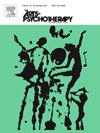音乐治疗治疗人格障碍的感知效应,B/C类:基于服务使用者体验的专题分析研究
IF 1.5
3区 心理学
Q3 PSYCHOLOGY, CLINICAL
引用次数: 0
摘要
循证实践(EBP)涉及到对现有最佳证据、临床专业知识和患者价值的整合。尽管有证据和临床专家指出,音乐疗法作为人格障碍患者多学科治疗方案的一部分是有益的,但患者的价值尚未得到充分探讨。为了深入了解服务使用者对音乐治疗感知效果的体验和价值,我们采用主题分析的方法进行了定性研究。27名被诊断为人格障碍的参与者被单独或焦点小组采访。参与者参加了不同的治疗项目,并至少参加了10次集体音乐治疗。15个转录本分三个阶段编码。从数据中产生了53个代码组、3个核心类别和11个子类别。核心分类是:期望,环境条件和音乐治疗的后果。结果或感知效果包括-有意义的体验(分为三个主题:个人发展,情绪调节和连通性)和-日常生活结果(分为:变化,未来计划和音乐治疗体验的评估)。本研究增加了服务使用者对音乐治疗的看法。音乐疗法在人格障碍患者的治疗方案中似乎很有价值,为他们提供有意义的经历,也为他们的日常生活带来积极的结果。这项研究虽然范围广泛,但其独特之处在于它系统地关注音乐治疗的感知效果,并为EBP做出贡献,因为患者价值是其三大支柱之一。本文章由计算机程序翻译,如有差异,请以英文原文为准。
Perceived effects of music therapy in the treatment of personality disorders, cluster B/C: A thematic analysis study based on service users’ experiences
Evidence-based practice (EBP) involves the integration of the best available evidence, clinical expertise and patient values. Although evidence and clinical expertise point to the benefits of music therapy as part of a multidisciplinary treatment programme for people with personality disorders, patient values are underexplored. To gain insight into service users' experiences and values of perceived effects of music therapy, we conducted a qualitative study using thematic analysis. Twenty-seven participants diagnosed with a personality disorder were interviewed individually or in focus groups. The participants were in different treatment programmes and had attended at least ten group music therapy sessions. Fifteen transcripts were coded in three stages. Fifty-three code groups, three core categories and 11 subcategories emerged from the data. The core categories were: Expectations, contextual conditions and consequences of music therapy. The consequences or perceived effects consisted of - meaningful experiences (divided into three themes: personal development, emotion regulation and connectedness) and - outcomes in daily life (divided into: changes, future plans and evaluation of music therapy experiences). This study adds to the knowledge of service users' perspectives on music therapy. Music therapy appears to be valuable in treatment programmes for patients with personality disorders, providing them with meaningful experiences that also lead to positive outcomes in their daily lives. This research, although broad in scope, is unique in its systematic focus on the perceived effects of music therapy and contributes to EBP as patient values is one of its three pillars.
求助全文
通过发布文献求助,成功后即可免费获取论文全文。
去求助
来源期刊

Arts in Psychotherapy
Multiple-
CiteScore
3.20
自引率
11.10%
发文量
66
期刊介绍:
The Arts in Psychotherapy is a dynamic, contemporary journal publishing evidence-based research, expert opinion, theoretical positions, and case material on a wide range of topics intersecting the fields of mental health and creative arts therapies. It is an international peer-reviewed journal publishing 5 issues annually. Papers are welcomed from researchers and practitioners in the fields of art, dance/movement, drama, music, and poetry psychotherapy, as well as expressive and creative arts therapy, neuroscience, psychiatry, education, allied health, and psychology that aim to engage high level theoretical concepts with the rigor of professional practice. The journal welcomes contributions that present new and emergent knowledge about the role of the arts in healthcare, and engage a critical discourse relevant to an international readership that can inform the development of new services and the refinement of existing policies and practices. There is no restriction on research methods and review papers are welcome. From time to time the journal publishes special issues on topics warranting a distinctive focus relevant to the stated goals and scope of the publication.
 求助内容:
求助内容: 应助结果提醒方式:
应助结果提醒方式:


